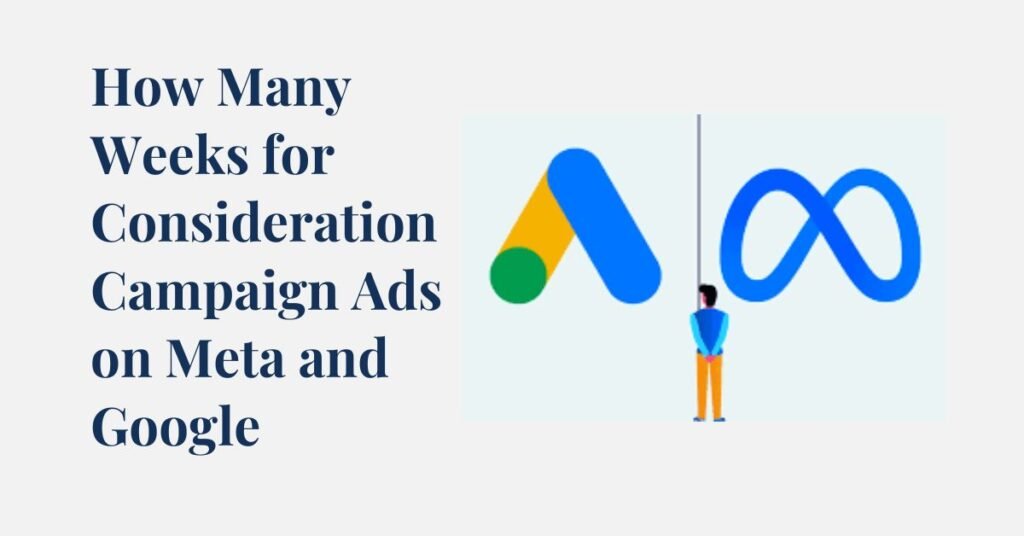In today’s digital age, advertising online has become essential for businesses of all sizes. If you’re looking to get people interested in your product or service, you might be considering running ads on Meta (which includes Facebook and Instagram) or Google. But how long should these ads run to be effective? This article will explore the ideal durations for consideration stage ads on both platforms and provide you with tips to make the most out of your advertising campaigns.
What Are Consideration Stage Ads?
Consideration stage ads are designed to get people interested in your product or service. These ads target individuals who are aware of your brand but aren’t ready to make a purchase yet. The goal is to provide them with more information, build trust, and eventually guide them towards making a decision.
Why Are They Important?
- Build Brand Awareness: They help potential customers learn more about your brand.
- Generate Leads: They can collect contact information from interested users.
- Educate the Audience: They provide detailed information about your products or services, helping people make informed decisions.
Ideal Duration for Consideration Campaigns
Meta (Facebook and Instagram)
Recommended Duration: 3-5 Weeks
- Why? Running your ads for 3-5 weeks gives enough time to reach and engage your audience. It helps in avoiding ad fatigue while ensuring that your message is seen multiple times.
- Considerations: Your budget, target audience, and ad content can affect the ideal duration. You might need to adjust based on how your audience is responding.
Google Ads
Recommended Duration: 4-6 Weeks
- Why? Google Ads, particularly on search and display networks, often require a bit more time to gather data and optimize performance. Running ads for 4-6 weeks allows for adequate testing and adjustment.
- Considerations: Similar to Meta, your budget and competition can influence the length of your campaign. Monitor performance and make necessary adjustments.
Factors Influencing Campaign Duration
Budget
- Limited Budget: If your budget is tight, you might need to run your campaign for a shorter period or narrow your target audience to maximize effectiveness.
- Larger Budget: A larger budget allows for a longer campaign duration, which can help in reaching a broader audience and optimizing ad performance.
Target Audience
- Niche Audience: If your product caters to a niche market, you might achieve your goals quicker.
- Broad Audience: For a wider audience, you may need more time to see significant results.
Competition
- High Competition: In a competitive market, longer campaigns can help you stand out and capture more attention.
- Low Competition: If there’s little competition, you might not need as long to achieve your objectives.
Marketing Goals
- Brand Awareness: If your primary goal is to increase brand awareness, a longer campaign might be more effective.
- Lead Generation: For generating leads, you might need to test different durations to find what works best.
Product Complexity
- Complex Products: If your product requires a lot of explanation, a longer campaign can help in educating your audience.
- Simple Products: For simpler products, shorter campaigns might be sufficient.
Tips for Running Effective Consideration Stage Ads
1. Define Clear Objectives
Before starting your campaign, know what you want to achieve. Are you looking to increase brand awareness, generate leads, or drive traffic to your website? Clear objectives will guide your strategy.
2. Know Your Audience
Understanding your target audience is crucial. Use the audience insights tools provided by Meta and Google to learn more about who you’re trying to reach. Tailor your ads to resonate with their interests and behaviors.
3. Create Engaging Ad Content
Ensure your ad content is both captivating and informative. Utilize high-quality visuals such as images and videos, craft clear and concise text, and incorporate a compelling call to action (CTA). Phrases like “Learn More,” “Sign Up,” or “Get Started” can effectively prompt users to take the next step.
4. Test and Adjust
Avoid setting up your ads and neglecting them. Consistently track their performance and make necessary adjustments. Conduct A/B testing with different versions of your ads to identify what resonates best with your audience.
5. Leverage Retargeting
Retargeting enables you to display ads to individuals who have previously interacted with your brand. This strategy helps keep your brand in their minds and can significantly boost conversion rates.
6. Track Performance Metrics
Monitor essential performance indicators, including click-through rates (CTR), conversion rates, and cost per conversion. Analyze this data to fine-tune your strategy and enhance your campaign’s effectiveness.
Useful Resources
To help you get started with your ad campaigns, here are some useful resources:
- Meta Advertising Guide
- Google Ads Help Center
- Meta Audience Insights
- Google Keyword Planner
Conclusion
Running effective consideration stage ads on Meta and Google requires careful planning and execution. While the recommended durations are 3-5 weeks for Meta and 4-6 weeks for Google, it’s important to consider factors such as budget, target audience, and competition. By defining clear objectives, understanding your audience, creating compelling content, and regularly monitoring and optimizing your ads, you can build successful campaigns that generate interest and drive results.
Remember, the key to a successful ad campaign is flexibility. Be prepared to make adjustments based on the performance data you collect. With the right approach, you can create ads that effectively reach and engage your audience, helping you achieve your marketing goals.
